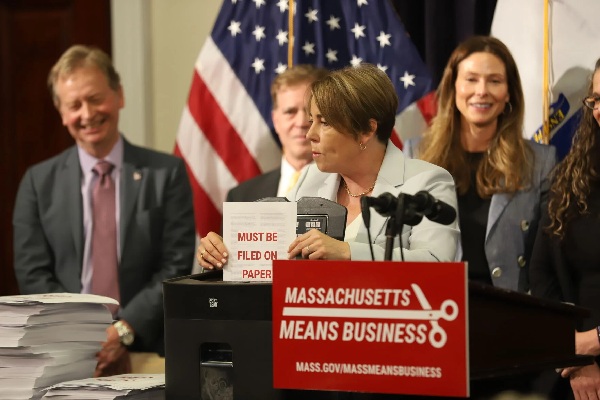Sam Drysdale
STATE HOUSE, BOSTON…..The Healey Administration is cutting or amending a quarter of all regulations under the oversight of the public-facing Office of Consumer Affairs and Business Regulation, an effort that officials say is intended to save businesses time and money.
The
regulatory updates
touch different types of businesses, including grocery stores, ski areas, barber shops, retail stores, banks and credit unions, telecommunications and electric companies, and others.
Gov. Maura Healey in January directed the office to conduct a review to make it easier to do business in the state, and she announced her plans at a State House press conference Wednesday morning.
“I asked all of our agencies to go out and look at all of their regulations and identify the ones that we could scrap, the ones that we should just get rid of. And they looked at, I think, over 150 sets of regulations,” Healey said. “Today we’re cutting down 38 different sets of regulations. That’s 25% of the total of all regulations.”
One of the changes removes the requirement that barber shops have a barber’s pole outside.
“I love this one,” she said. “Who doesn’t love the striped pole outside a barber shop? Right? Super cool. We love that image. But guess what? It wasn’t meant just for decoration. State law required a barber shop to actually hang a freaking pole right outside. Which might be wonderful, it does attract, it’s nice. But like really? There was a state requirement?”
The Division of Occupational Licensure (DOL) will also work with the Board of Registration of Cosmetology and Barbering on recommended changes to make education more accessible, eliminate “excessive burdens” and “support smaller businesses, including at-home practitioners.”
Layla D’Emilia, undersecretary at the Office of Consumer Affairs and Business Regulation, said former regulations required schools who wanted to offer cosmetology programs to have 25 chairs, which required 25 sinks.
“That seems crazy in a place where someone wants to open a school and they only want to have a small school,” D’Emilia said. The administration is also working with the board to offer apprenticeship programs, she said.
The updates are also striking a regulation that required banks and insurance companies to file documents by paper.
“There’s nothing wrong with paper, but that’s not where the world is,” Healey said.
The 13 independently-owned ski areas in Massachusetts will have updated requirements for trail signage, and the administration says changes have been made to “eliminate burdensome and extraneous testing.”
Asked about whether cutting back these regulations would impact skier safety, Commissioner of the Division of Occupational Licensure and Office of Public Safety Sarah Wilkinson said this change would unify signage on Massachusetts trails with nationwide standards, and save local businesses money.
“In theory, you could argue it’s safer for skiers, because they’re going to see the same warning signs in every state,” Wilkinson said. “We don’t think it’s any less safe, but we do think it’s easier for the businesses to more cheaply acquire those signs, and it’s more universal for the skiers to identify.”
Another change updates the unit price disclosure requirements for grocery stores, which the administration says haven’t been adjusted since 1996. State law mandates that most grocery items are individually priced with orange stickers, which can be complex to manage, especially for smaller stores. Critics have said it creates unnecessary administrative burdens and compliance costs for retailers.
The updated regulations allow the use of new technologies for unit pricing, as well as allowing more flexibility for how stores label their products.
“The modifications made in the law are going to make it probably clearer for folks to be able to shop,” said Brian Houghton, vice president of the Massachusetts Food Association.
Jon Hurst, president of the Retailers Association of Massachusetts, said the state’s regulations had not been combed through in over 16 years.
“When the governor announced this, I thought, ‘This is wonderful,’ although I was a little concerned,” Hurst said, “because frankly, I don’t want to get political here, governor, but your two predecessors, one Democrat, one Republican, also announced regulatory reform efforts at the beginning of their terms. Sixteen years later. Nothing had occurred.”
He added that he was “very encouraged” that “introspection is happening with state government here in Massachusetts.”
Asked how her efforts were similar or different from President Donald Trump’s Department of Government Efficiency (DOGE) as she tries to cut away red tape, Healey responded, “What DOGE turned out to be, though, was just indiscriminate firing of a whole bunch of people.”
“What we’re doing here, I think, is really constructive, thoughtful engagement with the business community,” she said.
Healey later added, “Rather than destroying government and destroying people with expertise — you’ve seen all the people that Musk and company had to bring back once they realized, ‘Oh s—, I fired the wrong guy.’ That’s not what we’re about. We’re about thoughtful introspection.”
Brian Shortsleeve, one of two Republicans running against the governor in 2026, shared a comment relative to the Healey’s cuts.
“Governor Maura Healey has spent her days in the Corner Office devastating Massachusetts’ business environment and making life unaffordable for working people through her support for increased regulations, fees and taxes. As a result, Massachusetts bleeding businesses, private sector jobs and workers, and is now dead last in the country in job growth. Brian Shortsleeve has built a career in the private sector building businesses and creating jobs as one of Massachusetts’ leading voices on economic growth. As governor, he’ll get to work on Day One making Massachusetts a place where good jobs and strong businesses are a priority once again,” said Holly Robichaud, strategist for campaign.



Leave a Reply